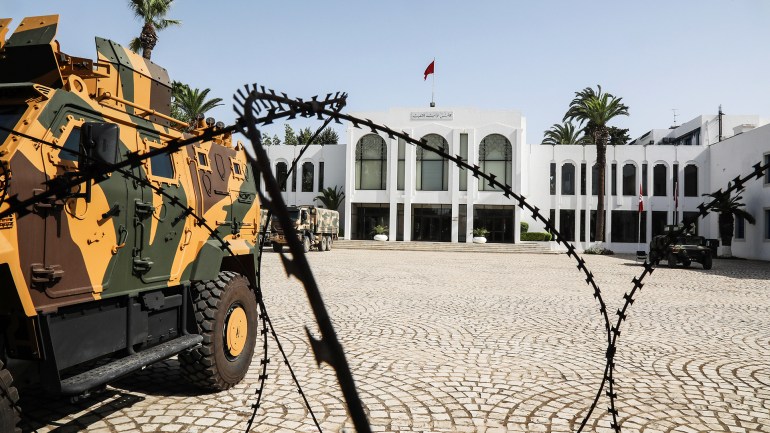“Tunisia’s democracy is under threat, and we cannot allow another slide towards tyranny.” With this headline, the head of the Ennahda movement, Rached Ghannouchi, began an article for him in the British Independent newspaper.
At the beginning of the article, Ghannouchi pointed out that the Tunisian National Dialogue Quartet was awarded the Nobel Peace Prize for its efforts, in cooperation with political forces, to build a pluralistic democracy in Tunisia.
He added that it did so through dialogue and the establishment of a peaceful and inclusive political process that led to the adoption of a pioneering constitution of which all Tunisians can be proud.
Since then, elections and political pluralism in an atmosphere of freedom, accountability and transparency have been the norm in Tunisia for a decade.
He cautioned that today this legacy is in grave danger and that the measures recently announced by President Kais Saied in Tunisia, the cradle of the Arab Spring, "put our nascent and fragile journey toward democracy under threat."
Ghannouchi urged all those who support freedom that "the time has come now to stand with Tunisian democracy, because we know how such a seizure of power usually ends."
He referred to the actual storming of media offices, preventing journalists from carrying out their work, sacking ministers and regional governors, placing judges and political leaders under house arrest, and mass travel bans for judges, lawyers, politicians, businessmen and civil society activists.
However, Ghannouchi expressed his gratitude that the bloodshed had so far been avoided. When parliament supporters began to gather in a sit-in in front of the parliament building, he urged everyone to disperse due to fears of possible confrontations that could lead to loss of life.
Everyone called for calm and vigilance, while focusing efforts on calling for a comprehensive and unconditional dialogue that brings together all political and social actors in order to end the stifling crisis in the country.
In order for there to be a legitimate government, the suspension of Parliament must be rescinded and it must return to vote on the new government.
Ghannouchi hinted that dialogue had helped Tunisians before, in 2013, when they overcame a very serious political crisis.
He stated that the president has so far rejected calls for dialogue, but he hopes wisdom will prevail in the end.
The Tunisian parliament building is closed by order of President Kais Saied (European News Agency)
He said that through dialogue, we can reach an agreement on a way out of the crisis, which should include not renewing the suspension of Parliament for another 30 days, and that the president nominate a prime minister and a government to be voted on by Parliament.
This is in addition to agreeing to the economic and political reforms that the state and the future government need to operate under.
Ghannouchi commented that in order for there to be a legitimate government, the suspension of Parliament must be canceled and it should return to vote on the new government.
In this way, the democratic will of Tunisians can be restored and the dangerous precedent of violating the constitution is put to an end.
He stated that Tunisians are right to be angry because the promises of the Tunisian revolution have not yet been fulfilled, after 10 years of transformation.
He added that the challenges facing the country cannot be allowed to lead to another dictatorship after countless Tunisians sacrificed their lives in order to build a democratic system that can protect freedoms and achieve social justice and dignity.
Ghannouchi believes that the hope now rests on Tunisians of all stripes to defend their democracy and call on the president to step back from the brink and engage in political dialogue and real and inclusive participation.
He concluded his article that Tunisian democracy, a beacon of hope for the Arab world, is being extinguished before the eyes of the international community by a familiar pattern of events "and we cannot allow that to happen."

